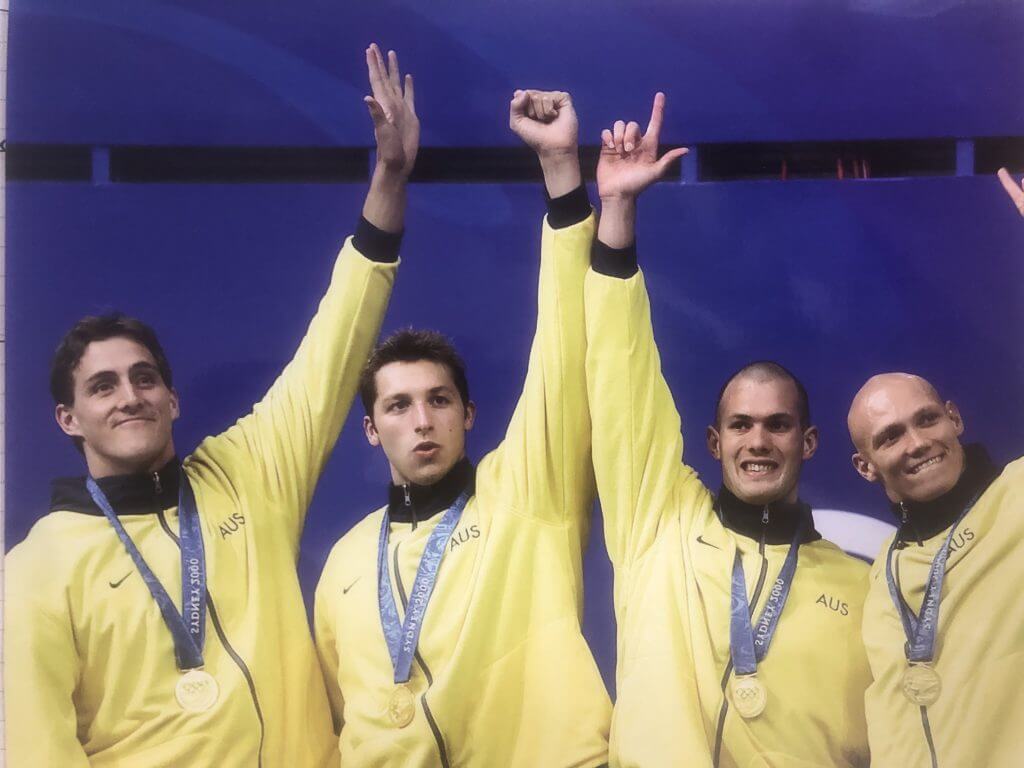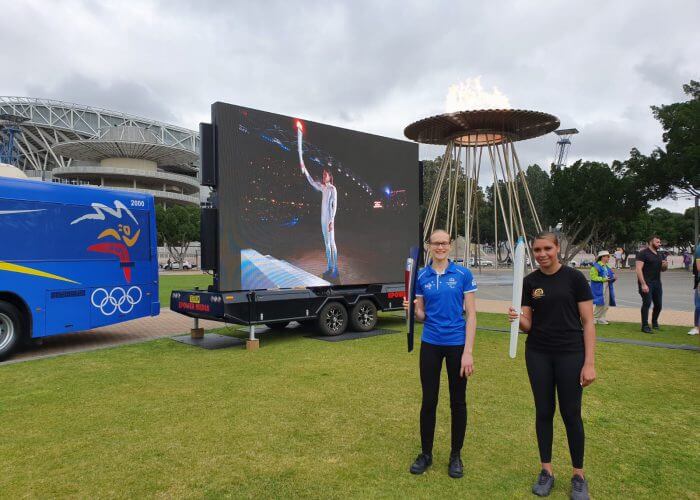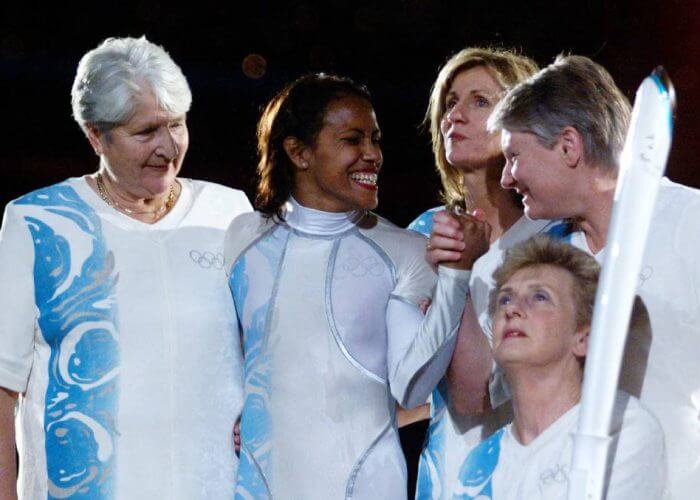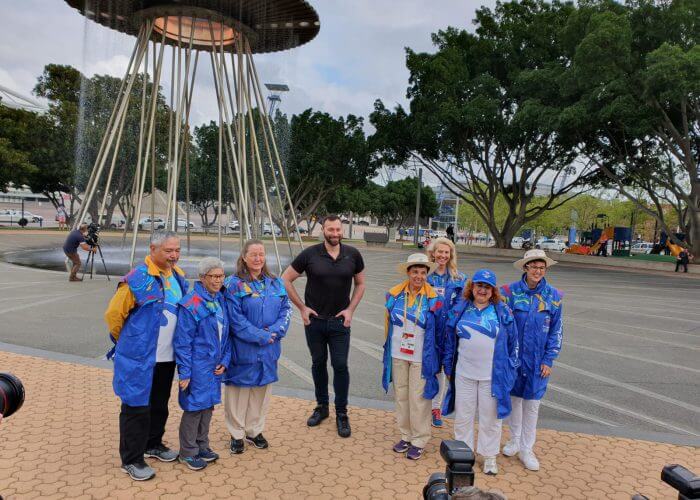Twenty years on and Iconic Australian Olympians Ian Thorpe And Dawn Fraser Take A Trip Down Memory Lane

Twenty years on and Iconic Australian Olympians Ian Thorpe And Dawn Fraser Take A Trip Down Memory Lane
Two of Australia’s greatest Olympians, swimmers Ian Thorpe and Dawn Fraser have today taken a trip back down memory lane to celebrate the 20th anniversary of the Sydney 2000 Olympic Games.
Sydney based Thorpe, who won three gold as a 17-year-old in the 400m freestyle and in the 4x100m and 4x200m freestyle relays was present at Sydney Olympic Park as the Australian Olympic Committee re-ignited the Olympic flame in a commemorative ceremony.
While Fraser, the triple Olympic 100m freestyle gold medallist from 1956, 1960 and 1964, speaking from her home on the Queensland Sunshine Coast, reflected on her appointment by IOC boss Juan Antonio Samaranch as the “First Lady of the Games” and the role of the volunteers.

CAULDRON COURT: Tamsin Colley (left) and Tenayah Logan, in the shadows of greatness at Cathy Freeman Park, Sydney Olympic Park. Photo Courtesy: Australian Olympic Committee.
Thorpe was joined on stage at Sydney Olympic Park by Paralympic wheelchair golden girl track athlete Louise Sauvage, 16-year-old basketballer Tenayah Logan, a member of the National Centre of Indigenous Excellence (NCIE) program and Tamsin Colley, a Rio 2016 Paralympian at just 14, in athletics.
And high on the agenda was the drama that unfolded with the infamous cauldron malfunction with iconic Australian indigenous champion Cathy Freeman holding the torch for three agonising minutes, while Thorpe and the Australian Swim Team were back in the Village watching the Opening Ceremony on television.

LADIES NIGHT IN SYDNEY: Sydney 2000 flashback with Dawn Fraser (left), Cathy Freeman, Debbie Flintoff-King, Raelene Boyle and Betty Cuthbert. Photo Courtesy: Andy Zakeli.
Fraser had already played her part, carrying the torch around the track in an all female torch bearing finale with Shane Gould, Debbie Flintoff-King, Betty Cuthbert, Raelene Boyle and Shirley Strickland de la Hunty and waited for Cathy trackside.
The swimmers, under the direction of legendary head coach Don Talbot, had been in a two week training camp in Melbourne and all eyes were on them and especially Thorpe – the kid from Sydney who was the name on everyone’s lips.
Thorpe had been coming to the Sydney International Aquatic Centre for four years to race at the Australian Age and NSW Championship meets with his coach Doug Frost – the youngest world champion at 15 in 1998 who rocked the pool in 1999 with his world record onslaught at the Pan Pacs – televised live for nine nights on Channel 9’s Wide World of Sports.
Swimming and Thorpie had arrived and 12 months later “the big dance” would be right in his own backyard.
Australia, the world and Sydney awaited.
“For me, I was never going to be able to walk in the Opening Ceremony and be in my best shape to be able to compete, so to be able to carry the flag in the Closing Ceremony most definitely made up for it, especially knowing how the country had received the Olympic Games and to see how much support there was,” said Thorpe.
“Australia and Sydney really did an incredible job of not only showing what sport can be for Australians, but what it can be for the rest of the world and the rest of the world still looks at us when it comes to the Olympics because of how successful the Sydney Olympics were.”
Asked by Channel 7’s Sunrise sports guru Mark Beretta, if he was aware of how big The Olympics were back then, Thorpe was quick to answer: “Yes I was…I didn’t know what the Olympics was going to be like but I knew it would be a big moment.
“And it was mostly because people would tell me they had won tickets in the ballot to go to the swimming on the first night and they would add something which freaked me out…(they would say) and I can’t wait to see you win your first Olympic gold medal which is a lot of pressure.
“And we went in (to the pool) on that first night and Australia had not won a gold medal at that stage and we thought we would win one in the triathlon earlier in the day.”
What unfolded remains high, if not the highest in so many people’s highlights of the Games…Thorpie agreed.

TEAM THORPE: Triple Sydney Olympic champion Ian Thorpe surrounded by members of the 2000 Olympic volunteer brigade at the 20th Anniversary of Sydney 2000 at Sydney Olympic Park. Photo Courtesy: Australian Olympic Committee.
Asked whether it was the most special night of his entire career Thorpe, who set a new world record with his gold medal in the 400m freestyle and anchored the men’s 4x100m freestyle relay, was quick to admit: “Yes it is…it quite simply is because it was at home and it was a moment in time that we created Australian sporting history in an event we were not expected to win the 4x100m freestyle relay.
“For some odd reason everyone thought we could…and we thought we could (too) but we just didn’t know how we were going to do it.
“(And when it was all over) I arrived back into the Village that night at around 1am and the people that were in the food hall because I had not eaten anything after the race – there was probably 30 people and all of them stood up and applauded me as I walked in.
“That is what the spirit of the Games (is all about)….athletes from all around the world that are up at that time that had just got back….”

FIRST LADY OF THE GAMES: Dawn Fraser – Australia’s National Treasure and living legend. Photo Courtesy: Delly Carr (Swim Australia/Ascta)
IOC president Antonio Samaranch had anointed Fraser as the First Lady.
“It was fantastic and an absolute honour that Samaranch gave me, being named as the First Lady Of The Games and I can’t believe it was all happening 20 years ago,” recalled Dawn.
“My most memorable moments include the men’s 4x100m freestyle relay swim on the first night and Thorpie’s swim (in the 400m).
“I was also mentoring quite a few of our athletes so it was absolutely fantastic to be amongst them…in an amazing Olympic Games and I still say today…that it was the best Olympic Games that was ever, ever held in the history of ancient and Olympic Games.”
And how did the First Lady tag unfold?
“I had a phone call from Samaranch from overseas and I said it would be a pleasure to be his partner at the Opening Ceremony and making me the First Lady of the Games was also recognising women in sport,” said Fraser.
“I had a ticket to any event I wanted to go to and I went to the majority of sports and it was absolutely fantastic.
“My accreditation allowed me to go into any part of the Olympic Games I wanted to.
“But what I remember mostly about the Olympic Games were the volunteers..they made the Games…to see them singing at the airports at the train stations and at the beach volleyball they made everyone get up and sing and I say that’s why the Games were so successful.”



